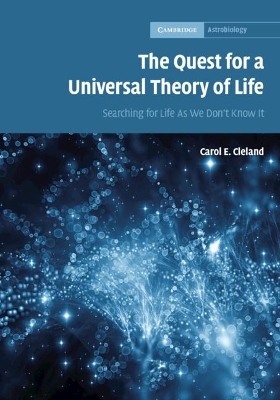
The Quest for a Universal Theory of Life
Cambridge University Press (Verlag)
978-0-521-87324-6 (ISBN)
Integrating both scientific and philosophical perspectives, this book provides an informed analysis of the challenges of formulating a universal theory of life. Among the issues discussed are crucial differences between definitions and scientific theories and, in the context of examples from the history of science, how successful general theories develop. The central problem discussed is two-fold: first, our understanding of life is still tacitly wedded to an antiquated Aristotelian framework for biology; and second, there are compelling reasons for considering that familiar Earth life, which descends from a last universal common ancestor, is unrepresentative. What is needed are examples of life as we don't know it. Potential sources are evaluated, including artificial life, extraterrestrial life, and a shadow biosphere right here on Earth, and a novel strategy for searching for unfamiliar life in the absence of a definition or general theory is developed. The book is a valuable resource for graduate students and researchers studying the nature, origins, and extent of life in the universe.
Carol E. Cleland is Professor of Philosophy at the University of Colorado Boulder, where she is also Director of the Center for the Study of Origins and a Co-Investigator at the Center for Astrobiology. She teaches advanced interdisciplinary courses in the philosophy of science, including graduate seminars on central issues in astrobiology. She publishes papers in major science and philosophy journals, and is co-editor of the anthology The Nature of Life (Cambridge, 2010).
Acknowledgments; Introduction; 1. The enduring legacy of Aristotle: the battle over life as self-organization or (genetic-based) reproduction; 2. Why life cannot be defined; 3. What is a scientific theory; 4. How scientific theories develop; 5. Challenges for a universal theory of life; 6. Rethinking the traditional paradigm for life: lessons from the world of microbes; 7. Artificial life: could ALife solve the N=1 problem?; 8. Searching for extraterrestrial life without a definition or universal theory of life; 9. A shadow biosphere: alien microbes on Earth?; Conclusion; References; Index.
| Reihe/Serie | Cambridge Astrobiology |
|---|---|
| Zusatzinfo | Worked examples or Exercises |
| Verlagsort | Cambridge |
| Sprache | englisch |
| Maße | 178 x 253 mm |
| Gewicht | 610 g |
| Themenwelt | Naturwissenschaften ► Biologie ► Evolution |
| Naturwissenschaften ► Physik / Astronomie ► Astronomie / Astrophysik | |
| ISBN-10 | 0-521-87324-X / 052187324X |
| ISBN-13 | 978-0-521-87324-6 / 9780521873246 |
| Zustand | Neuware |
| Informationen gemäß Produktsicherheitsverordnung (GPSR) | |
| Haben Sie eine Frage zum Produkt? |
aus dem Bereich


